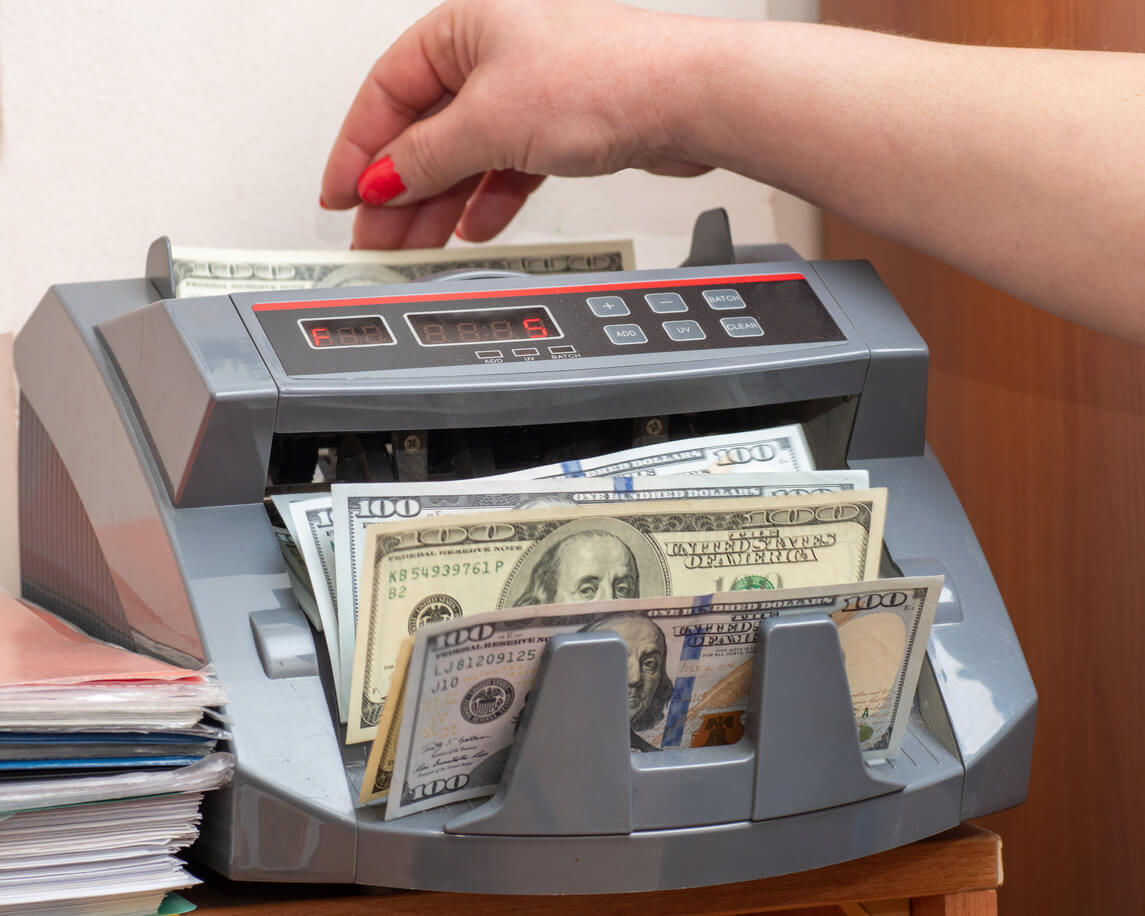Bank closures have become a topic of worry in recent years, with the COVID-19 pandemic spurring ever-increasing changes to how businesses go about their day-to-day operations. But why are banks collapsing, and is a US banking crisis on the horizon?
There have been multiple bank branch closings in the past year, leading many to think the 2023 United States banking crisis is going to continue into 2024. This article will cover banks closing down, banks at risk of failure, and what you need to know about the impending financial climate.
- 2023 and 2024 Bank Closures
- 2025 Bank Closures
- Why Banks Fail
- Do Failures Lead to Recession
- Economic Impact
- Banks at Risk

For most retailers, provisional credit is the only option, but CashSimple™ does more.
Bank Closures in 2023 and 2024
In 2023, America saw its highest amount of bank closings since the 2008 recession. The increase in mobile banking use, inflation and interest rates, and real-estate struggles all contributed to why 2023 experienced so many banks shutting their doors. These issues caused Silicon Valley Bank to collapse in March 2023, with First Republic Bank and Signature Bank following only a few months later. Combined, these banks had hundreds of billions of dollars in assets.
These problems initially carried into 2024 making many uneasy about the overall security of financial institutions across the country. The Federal Deposit Insurance Corporation (FDIC) has continued to see more bank branches fail, as outlined by the FDIC failed bank list, with the economy still struggling as a result.
However, 2024 did not experience the same financial impact of 2023 that made many worry at the beginning of the year. According to the FDIC, there were only two bank failures in 2024. The first was in April of the Republic First Bank in Philadelphia, and the second was The First National Bank of Lindsay in October, located in Lindsay, Oklahoma.
The overall improved position of banking is leading many experts to believe that banking infrastructure has stabilized for 2025.
Bank Closures in 2025
Uncertainties around the economy are constantly lingering in everyone’s minds in 2025, making people more conscious about where their money is. As of May 15, only one bank has failed in 2025, it being the Pulaski Savings Bank in Chicago, Illinois. This is roughly the same number of bank failures in 2024 at this point of the year.
Even though only one bank has failed outright this year, the trend of banks closing locations continues. As of May 2, 2025, there have been 336 bank branches closed, and more branches are expected to close. Major 2025 bank closures include:
- Santander is closing 18 branches in the New England region by August 2025, focusing more on its U.S. digital bank Openbank.
- In February 2025, U.S. Bank announced its plan to close 7 branches in eastern Idaho by June 2025.
Experts continue to believe this may be one of the worst years for bank closures. This is detrimental to businesses’ cash management, as the bank location to which it deposits money may not be open by the end of the year.
A solution like CashSimple® by Integrated Cash Logistics, which buys your cash as soon as it enters the smart safe and deposits it directly into the bank account of your choice, offers flexibility whether you operate a single retail location or manage multiple sites with different banking relationships. It also helps alleviate the risk of disruptions caused by bank closures.
Why Are Banks Failing?
Banks are an imperative cog in the economy. From small community banks to large corporate holdings, these institutions hold immense power over how America does business. This is why bank issues can quickly wreak havoc on the population.
But just why are banks shutting down? Some of the most common reasons include:
- Bank Assets Decline in Value: Assets are items that banks own, such as cash, investments, loans, and reserves. When these assets decline in value due to increased interest rates, banks don’t have enough assets to pay off their debts or other business necessities, which can cause banks to close.
- Economic Factors: Higher interest rates also often lead to slower economic growth, meaning people are spending less money. Inflation, recessions, and housing market crashes can all cause banks to shut down.
- Regulation: The government provides many regulations that banks must follow, especially after the 2008 recession. Specifically, the FDIC protects individuals against losing their deposits if an insured bank fails. If there are stricter regulations put in place by these agencies, or in extreme cases, congressional oversight is enacted, there is a greater risk of bank branch closures.
- Technological Changes: Online and mobile banking have also caused an issue with banks closing. With online banking rising in popularity, brick-and-mortar locations have struggled to make ends meet, causing more branch closures.
Why Are Banks Closing Down Customer Accounts?
In other bank closure news, banks are closing customer accounts with little explanation as well. The main reason this has been happening more frequently is due to an increase in fraudulent activity. Banks have been cracking down on any sort of potentially dangerous activity in order to protect themselves from losing money.
Also, some US banks are abruptly freezing accounts that have not had activity for a long time. This works as a sort of preventative measure to safeguard their holdings and help protect against overall bank failures.

Save on your bottom line by avoiding unexpected and hidden fees from other cash handling services.
Do Bank Closures Lead to Recession?
Bank failures do not automatically point towards a recession. However, many factors coupled alongside a troubled bank climate can lead to recession or economic collapse. An increase of banking stress can lead to even more small banks closing their doors, affecting small business lending, individual accounts, and overall economic prosperity.
While the 2008 recession did partially occur due to bank failures, it was on a much grander scale due to the increase of lending to borrowers who normally wouldn’t qualify. This was compounded with rising inflation from the Federal Reserve, bank insolvency, and, eventually, the Lehman Brothers bank collapse in late 2008. All of these factors together caused the recession.
The Economic Impact of Bank Closure
Bank closures don’t just broadly affect the economy – the FDIC problem bank list can also start to wreak havoc on how banking affects individuals, their assets, and businesses. Businesses will have to change how they manage and invest their money, while individuals may find themselves in a “banking desert,” with no banks available near them for 10-20 miles. Closing banks can also drastically affect housing and employment.

Schedule a demo with Integrated Cash Logistics to shorten your distance to cash today.
Financial Contagion
Financial contagion is when an economic crisis spreads from one market, region, or country to another. This often affects all aspects of the economy, including labor, inflation, goods and services, and financial markets. While good economic markets can also contribute to financial contagions by bolstering surrounding markets, they often refer to negative impacts from other countries or economies. For example, the recession of 2008 affected the global economy in many ways.
Bank Runs
Like a scene out of It’s a Wonderful Life, a bank run is when customers are worried about the bank or economy losing money and then “making a run” to withdraw everything they have. This can quickly turn devastating for banks, as this can cause them to lose almost all of their assets immediately. If a bank has been struggling and customers hear about it, this can cause them to close, which is exactly what happened with Silicon Valley Bank in 2023.
Unemployment Increases and Changes
Bank collapses also have the added economic impact of affecting employment. When the economy isn’t doing well, many businesses will lay off or fire employees, leading towards economic ruin due to individuals not being able to spend money since they aren’t making enough. This, coupled with businesses not stimulating the economy, continues to affect the financial downturn.
Digital Barriers For Disabled Customers
While the increase in online banking can help individuals who have motor impairments, it also poses problems for those with auditory, visual, and cognitive disabilities. Many websites and apps rely on individuals to intuitively interact with and understand them, and they often don’t have the requisite accessibility needs for many individuals.
Longer Travel to Banks
As mentioned earlier with “bank deserts,” with more and more in-person banks closing, this affects how easy it is for people to travel to and access banks. While many individuals can simply drive to one, many others rely on public transportation, which can be unreliable and take much longer.
However, for businesses that utilize smart safe technology like Integrated Cash Logistics, this issue is remedied immediately. Our CashSimple™ services streamline change orders, deposits, and issues with armored transportation, as our system provides this all in one single point of contact.

Costs for armored car services is just one of many among other bank and logistics fees.
Increased Banking Relationships
With more and more banks closing, this often creates the need for increased banking relationships. For example, if businesses have locations in multiple places, they may need to depend on relationships with multiple banks because of proximity. This adds another layer of complexity to banking transactions and bank fees while increasing stress and increasing the potential for mishaps.
With CashSimple™, our all-inclusive structure allows you to do everything you need to with our cash-capture technology.
Increased Cost For Banking Services
Multiple banking relationships, or even just additional services used at one location, often increase the cost of using the bank itself. Also, since many financial institutions are attempting to reverse their economic downturn, they have already increased the price of their services, meaning that businesses and individuals have to worry about spending more money on essential services they used to pay less for.

Smart safes do more than keep cash secure. Learn how cash capture technology shortens your distance to cash.
Which Banks Are At Risk?
While it’s hard to predict what banks may be at risk of closure, as many institutions keep this information close to their chest, there are several warning signs that you can be on the lookout for. These include:
- Falling Stock Prices: If bank stock prices begin to fall, this is often a sign of potential closure in the future. Since recessions and economic downturns often directly affect stocks, a falling stock price can indicate that your bank is starting – or close to – going under.
- Inaccurate or Inaccessible Reporting: If your bank starts to make it difficult to access your account information, or if you notice inaccurate information, this can be another sign of impending collapse.
- Declining Profits: Banks make money when they are able to invest their customers’ money at a higher interest rate than what they received it at. They also collect money from interest rates and service fees. Therefore, if they are losing profits despite these avenues of revenue, then this is another sign of potential failure.
- Increasing Loan Defaults: Lastly, if you notice your bank having many loan defaults in a short period of time, this often points to less revenue as well.
CashSimple™: Bank With Who You Want, Where You Want
There were significant bank closures in 2023, and many are concerned that 2024 will bring more of the same. However, this all depends on how banks, individuals, and businesses cope with the current economic climate. Is there a way for us to turn these bank closures around into a more profitable economy? How can you protect your assets from the risks of bank or branch closures?
One way is to utilize Integrated Cash Logistics’ CashSimple™ technology. Our smart safe offers a single point of contact for managing armored car companies and financial institutions, detailed reporting, and risk management. We let you bank where you want, with who you want. Have the freedom to choose which locations are best for your business and streamline banking relationships while minimizing risks and expenses.
ICL’s streamlined deposit and change ordering system plus the ease of banking where you need ensures you spend more time doing what you do best – running your business. If you’re ready to learn more about how our cash capture technology can help you, schedule a demo today to discover how we simplify how your business controls cash.
